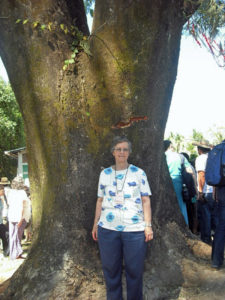By Barb Arland-Fye
The Catholic Messenger
DAVENPORT — El Salvador has been described as one of the most violent areas in the Western Hemisphere, but it’s also a place where Sister Johanna Rickl, CHM, witnessed signs of hope.

Sister Johanna Rickl, CHM, poses in front of a tree at the site where four churchwomen were murdered Dec. 2, 1980, in El Salvador. Sr. Rickl was among pilgrims at the site Dec. 2, 2015, to commemorate the women’s lives.
The president of the Congregation of the Humility of Mary made a pilgrimage to El Salvador last month to mark the 35th anniversary of the murders of four U.S. churchwomen who served suffering Salvadorans in that Central American country.
Sr. Rickl listened to stories of families devastated by the civil war (1980-92), funded in part with $6 billion from the U.S., according to The Center for Media and Democracy’s PR Watch (8-16-12).
Families shared how loved ones had been tortured, disappeared and/or murdered, largely at the hands of the military-led Salvadoran government. She also listened to women’s groups in rural communities who spoke of rebuilding their lives while working toward economic sustainability, food sovereignty, land rights, advocacy and a voice in government.
Sr. Rickl recalls being awestruck by the sight of a huge guanacoste tree that represents a “living witness to the crime” at the site where the four churchwomen were slain. The people who worked to create a heritage site in that location insisted that the tree be a part of it. “The blood of the martyrs is right there. That tree holds the history of their lives and sacrifice,” she reflected. She and the other pilgrims gathered there Dec. 2, the anniversary of the churchwomen’s murders.
Two days earlier, the pilgrims visited the Monument to Truth and Memory in a city park in San Salvador. Its granite wall is engraved with the names of 30,000 people killed or disappeared and 200 rural communities in which massacres occurred. “The United Nations Commission estimated that at least 70,000 Salvadoran civilians were killed and more than 10,000 disappeared,” Sr. Rickl said.
A panel of older women gave a talk at the monument, sharing their frustration at having requested repeatedly but never receiving information about the fate of their sons and daughters. The women “seemed to draw strength from our attentive listening to their stories. As they spoke, they thanked us for coming, pointing out that our presence let them know they were not forgotten in their struggle, still going on after 35 years, to have closure at last and also justice for their loved ones,” Sr. Rickl observed.
In a visit to one of the rural communities, witness “Maria Elena affirmed, ‘we do not live in safe worlds, but we must have life.… Any life that is worthwhile is not free …’ but rather comes with a cost. ‘When someone is sick, that’s when the brother or sister needs you’ … not after you have waited for everything to be safe. You must make the decision to be connected.”
Sr. Rickl said SHARE El Salvador and the Leadership Conference of Women Religious (LCWR), sponsored the pilgrimage to celebrate the memories and ministry of Maryknoll Sisters Maura Clarke and Ita Ford, Ursuline Sister Dorothy Kazel and lay missioner Jean Donovan. They were abducted, raped and murdered Dec. 2, 1980, by military and paramilitary forces, their bodies heaped in a grave about 15 miles from El Salvador’s airport.
Four Salvadoran National Guardsmen were convicted of the churchwomen’s killings in 1984 and sentenced to 30 years in prison, according to Catholic News Service. Social justice advocates seek to reopen the investigation to bring the crime’s masterminds to justice and closure for victims’ families.
“The death of the women touched me because I had been working in Chiapas (in Mexico) and Maryknoll sisters were among our fellow missionaries,” Sr. Rickl said. “We were many miles away physically but spiritually we were very close because of the similarity in our work with poor people who have been oppressed.” That’s why closure for victims and their families is so important, she added.
Today, she’s encouraged to see previously oppressed people moving into leadership roles in advocacy and governing, with SHARE’s mentorship. The nonprofit organization seeks to strengthen solidarity with and among the Salvadoran people in El Salvador and the United States in the struggle for economic sustainability, justice and human and civil rights.
“SHARE is strengthening (Salvadorans’) democratic base and keeping youths engaged in their communities so they don’t feel the need to get involved in gangs,” Sr. Rickl said. But, she noted, a Salvadoran woman told her that if the rampant gang problem isn’t stopped, it will lead to organized crime running the country. Gangs are more prevalent in the urban areas. As a result, the pilgrims, who spent some of their time in San Salvador, did not walk outside the hotel except to get on and off the bus.
In a talk Sr. Rickl gave at Sacred Heart Parish in Moline, Ill., following her pilgrimage, she emphasized the importance of being present to others, at home and abroad. She asked: “In what ways will we choose to be connected, to be a loving, listening and responsive presence to those around us, especially the ones who suffer?”











